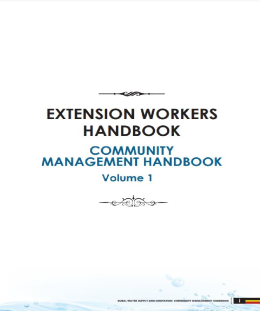RWSN Ressources

Author
Ministry of Water and Environment, Uganda
Year of Publishing
0000
Publisher
Institution
Extension Workers Handbook
Community Management Handbook- Volume 1
Description:
The Review of the Rural Water and Sanitation Handbook for Extension Workers (2000) in
2016, reaffirms the Government of Uganda’s commitment towards ensuring availability
and sustainable management of water and sanitation for all by 2030. This is in line with
the Sustainable Development Goals (SDGs). The first hand book was developed in 2000
with the major aim of enabling Extension Workers to facilitate community action with
regard to water and sanitation development, management, operation and maintenance of
facilities, and eventually sustainability.
Prior to the review of the handbook, a study was undertaken in 2014, to assess the
effectiveness of the participatory community management approaches highlighted in the
handbook. The study findings indicated that the sector had made progress regarding the
functionality and management of water facilities as indicated by 85% functionality of
water sources and 72% functionality of water and sanitation management committees.
The study further indicated a number of challenges affecting the sector including, lack of
access to spare-parts, unwillingness of water users to contribute towards the management
of installed facilities, voluntary nature of water and sanitation committees and inadequate
support to communities by extension staff. The study further revealed that a number of
good management and technological innovations had emerged.
The Revised Rural Water and Sanitation Extension Workers Handbook (2016) has
therefore taken stock of the challenges mentioned above and the emerging innovations.
New innovations have been highlighted in the areas of communal fund management,
Sub County management structures, Self- Supply approaches, Rainwater Harvesting
Technologies and Community Led Total Sanitation (CLTS) among others. Effort has
been undertaken to ensure that the Handbook is well illustrated, user friendly and that it
captures best practices and experiences for use by extension workers.
Special thanks and acknowledgements go to the staff of the Ministry of Water and
Environment, Local Government staff, Sector Development Partners, more especially
EU Water Facility and WaterAid Uganda. More thanks go to the selected communities
that assisted and provided information in various ways during the review process.
It is my sincere hope that this handbook which contains well itemized procedures, processes
and tools to use, guides Extension Workers to facilitate communities towards increased
utilization, sustainable operation and maintenance of water and sanitation facilities.
I commend this handbook to Community Development Workers, Health Workers and
Water Engineers who work in both public, Civil Society and private sectors within the
communities.
Prof. Ephraim Kamuntu
MINISTER OF WATER AND ENVIRONMENT - UGANDA
Bibliographical Information:
Ministry of Water and Environment, Uganda (0000) Extension Workers Handbook. Community Management Handbook- Volume 1
DOWNLOADS (86)
Extension Workers Handbook Community Management Handbook Volume 1
 Google Übersetzer
Google Übersetzer
